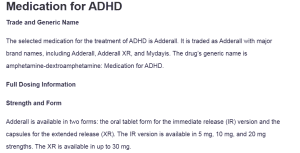Medication for ADHD
Trade and Generic Name
The selected medication for the treatment of ADHD is Adderall. It is traded as Adderall with major brand names, including Adderall, Adderall XR, and Mydayis. The drug’s generic name is amphetamine-dextroamphetamine: Medication for ADHD.
Full Dosing Information
Strength and Form
Adderall is available in two forms: the oral tablet form for the immediate release (IR) version and the capsules for the extended release (XR). The IR version is available in 5 mg, 10 mg, and 20 mg strengths. The XR is available in up to 30 mg.
Route
Adderall and Adderall XR are both taken orally.
Frequency
The initial dose for the immediate-release version should be started at 5 mg once or twice daily. If optimal response is not achieved with the current dosage, it is advised to increase the dose by 5 mg weekly as needed. However, the daily dose should never exceed 40 mg. For the extended-release version, the initial dose should be started with 10 mg administered once daily.
A 20 mg per day is recommended for patients starting on the XR version for the first time or using Adderall XR as an alternative to other medications. The dosage can be increased weekly by 5 to 10 mg as needed. The max dose for the XR version is 30 mg/day.
Number to Dispense
For the once-a-day dose, it required to dispense 30 tablets/capsules limited to a month’s supply. If twice a day dosage is needed, dispense 60 tablets/capsules for a month’s supply.
Number of Refills
Adderall is classified as a Schedule II controlled substance. Supply is limited to 30 days. There are no refills unless otherwise necessary. If necessary, the refill should be done once and adhere to the refill policies for controlled substances, including patient adherence to the follow-up appointments.
Rational for Prescribing Adderall
Adderall is prescribed to manage and treat ADHD over other medications such as Ritalin or Concerta. Although both Adderall and Ritalin have proven to be effective in managing and treating ADHD, Adderall has shown to be more effective across patients with diverse needs (Dubljević, 2019). The stimulant effects of Adderall due to its action leading to increased catecholamines; dopamine and norepinephrine, availability in striatal and cortical regions within the basal ganglia affect executive function, leading to improved attention, focus, and impulse control (Faraone & Author, 2018).
Adderall is also a combination of amphetamine and methylphenidate salts, whose action mechanism targets catecholamines, including norepinephrine and dopamine. Hence, a double action that is effective in ADHD symptom control. Therefore, making Adderall a first-choice medication for ADHD over single-agent treatments such as Ritalin.
Adderall also provides flexibility for dosing across different patients while helping to effectively achieve significant symptom improvements. The availability of immediate-release and extended-release versions make it possible to tailor doses to patient’s needs including age, severity and duration of current symptoms, current medications, and lifestyle.
Special Considerations
Taking Adderall requires special considerations for administration in order to improve the effectiveness of the drug. For instance, it is important to consider taking Adderall without food or before food, as certain foods may slightly delay the onset of action. It is also important to avoid taking any acidic foods, beverages, or supplements that may lead to reduced drug absorption.
Administering Adderall as a Schedule II controlled substance requires close monitoring to avoid abuse and misuse. Adderall use for ADHD treatment has the potential to lead to addiction and mental distress (Cregin et al., 2021). As such, it is important to consider the chemical and drug history of the patient, including stimulant drug and substance use. Notably, individuals with a history of substance use disorder have a high risk of abusing Adderall.
Common Side Effects
Common side effects associated with taking Adderall include decreased appetite, headaches, high blood pressure and increased heart rate, notable weight loss, dry mouth, anxiety, and nervousness. Also, patients taking Adderall may experience nausea, regular stomach upsets, diarrhea, dizziness, and insomnia.
Recommendations
For prescribers, it is recommended to analyze the patient’s medical, health and drug use history, and age before prescribing Adderall. For patients, it is recommended to adhere to administration timing, dosage frequency and amount, stay hydrated, monitor side effects, and keep all medications in a safe place to avoid contamination and misuse by others. In case of a missed dose, it is recommended to take the medicine immediately and to skip the missed dose if its close to the next scheduled dose.
References
Cregin, D., Koltun, R., Malik, S., Umeozor, D., & Begdache, L. (2021). The Adderall epidemic: A proposed cyclic relationship between ADHD medication use, academic performance, and mental distress. In The Premier Undergraduate Neuroscience Journal. The State University of New York at Binghamton. https://assets.pubpub.org/ualu5q36/11643848086892.pdf
Dubljević, V. (2019). Neuropharmacology, addiction and autonomy: A proposal for public policy on Adderall and Ritalin as pharmacological enhancements. International Library of Ethics, Law and Technology, 19, 45–63. https://doi.org/10.1007/978-3-030-13643-7_4
Faraone, S. V, & Author, C. (2018). The pharmacology of amphetamine and methylphenidate: Relevance to the neurobiology of attention-deficit/hyperactivity disorder and other psychiatric comorbidities. Neuroscience and Biobehavioral Reviews, 87, 255. https://doi.org/10.1016/J.NEUBIOREV.2018.02.001
ORDER A PLAGIARISM-FREE PAPER HERE
We’ll write everything from scratch
Question
Choose any medication used for the treatment of ADHD.
- List the drug name: Trade name and generic
- Full dosing information: strength, form, route, frequency, number to dispense and number of refills
- Rational for prescribing this medication
- Any special considerations: i.e. take with food, avoid grapefruit, etc.
- Common side effects
- Recommendations: i.e. take in morning, take at night, what to do if a dose is missed, etc.
- List references.
Medication for ADHD
Text:
- DSM-5-TR text


